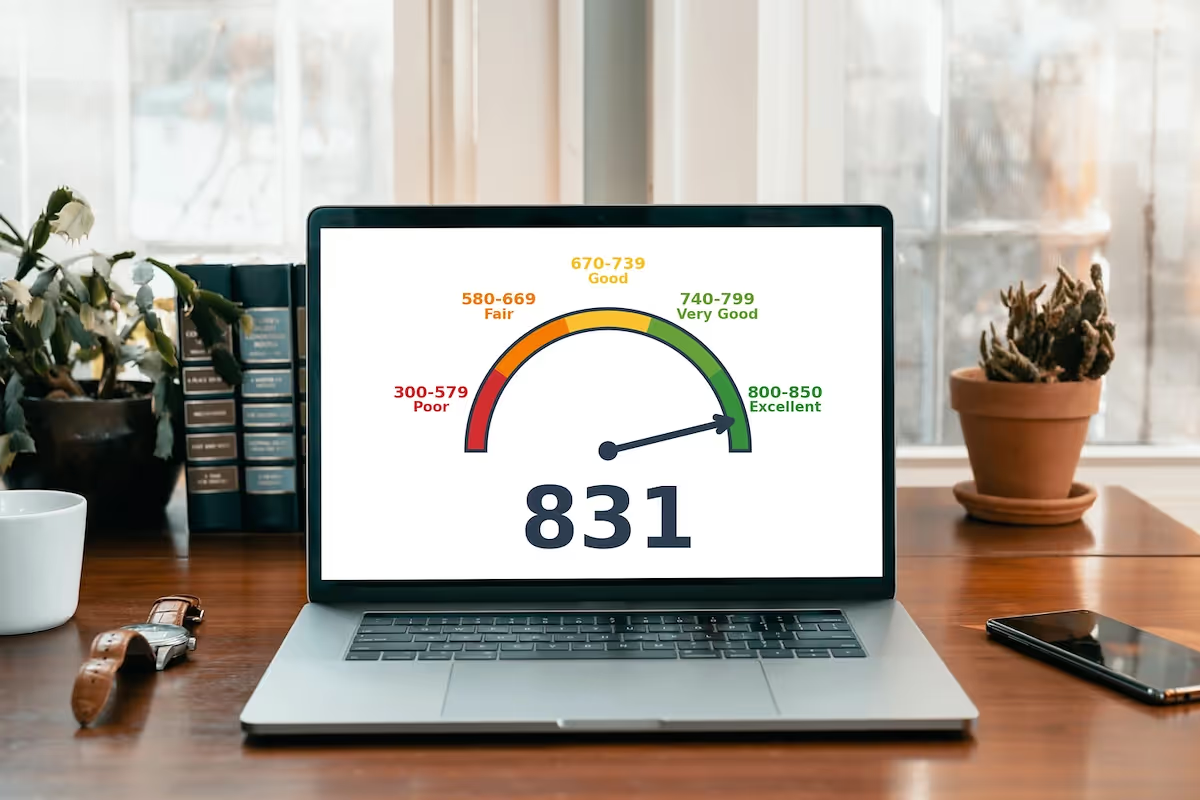
Kudos has partnered with CardRatings and Red Ventures for our coverage of credit card products. Kudos, CardRatings, and Red Ventures may receive a commission from card issuers. Kudos may receive commission from card issuers. Some of the card offers that appear on Kudos are from advertisers and may impact how and where card products appear on the site. Kudos tries to include as many card companies and offers as we are aware of, including offers from issuers that don't pay us, but we may not cover all card companies or all available card offers. You don't have to use our links, but we're grateful when you do!
831 Credit score: What You Need to Know in 2025
July 1, 2025


TL;DR
An 831 credit score is not just good; it's an outstanding rating that demonstrates top-tier creditworthiness. This places you squarely in the "Exceptional" FICO score category, giving you access to the most competitive financial products available.
What Does a 831 Credit Score Mean?
An 831 credit score places you in the "exceptional" tier of the FICO scoring model, which ranges from 300 to 850. This is the highest category, signaling to lenders that you are an extremely low-risk borrower. Financially, this means you have access to the best possible terms on loans and credit cards. You can expect to be offered the lowest interest rates for mortgages and auto loans, translating into significant savings.
Having already achieved an elite credit status, your financial outlook is bright. The challenge moving forward is less about improvement and more about maintenance. Continuing the responsible habits that earned you this score is the key to preserving your access to top-tier financial products and securing your financial future.
Who Has a 831 Credit Score?
While age isn't a direct factor in calculating your credit score, there's a clear trend showing that scores tend to improve over time. This is often because older individuals have had more time to build a positive payment history and a longer credit history. Based on 2023 Experian data, here is the average FICO score by generation:
- Generation Z (ages 18-26): 680
- Millennials (ages 27-42): 690
- Generation X (ages 43-58): 709
- Baby Boomers (ages 59-77): 745
- Silent Generation (ages 78+): 760
Credit Cards With a 831 Credit Score
An 831 credit score is considered exceptional, placing you in the top tier of borrowers. This high score significantly increases your chances of approval for virtually any credit card, including premium rewards and travel cards. Lenders will likely offer you their best terms, such as the lowest available interest rates and highest credit limits.
Kudos simplifies the search with its Explore Tool, which uses a quiz to match your preferences against nearly 3,000 cards to find the right fit for your financial situation. For a deeper analysis, the AI-driven Dream Wallet can analyze your spending habits to provide hyper-personalized recommendations.
Auto Loans and a 831 Credit Score
With an 831 credit score, you fall into the super-prime category, which is excellent news for securing an auto loan. Lenders view you as a very low-risk borrower, meaning you will likely qualify for the best available interest rates and most favorable loan terms.
According to a 2025 analysis, here are the average auto loan rates for different credit score brackets:
- Super-prime (781-850): 5.25% for new cars and 7.13% for used cars
- Prime (661-780): 6.87% for new cars and 9.36% for used cars
- Non-prime (601-660): 9.83% for new cars and 13.92% for used cars
- Subprime (501-600): 13.18% for new cars and 18.86% for used cars
- Deep subprime (300-500): 15.77% for new cars and 21.55% for used cars
Mortgages at a 831 Credit Score
With an 831 credit score, you are in an excellent position to secure a home loan. This score surpasses the minimum requirements for all major mortgage types, including Conventional, Jumbo, FHA, VA, and USDA loans. Lenders will view you as a low-risk applicant, which greatly increases your chances of approval and can lead to a smoother underwriting process.
Your high score directly translates into significant financial benefits. You will qualify for the most favorable loan terms, including the lowest available interest rates and reduced private mortgage insurance (PMI) premiums. This strong credit profile also provides more loan choices and gives you leverage to negotiate closing costs or other incentives from lenders.
What's in a Credit Score?
Figuring out what goes into your credit score can feel like trying to solve a complex puzzle, but it generally boils down to a handful of key elements. The most common factors include:
- Your payment history, which tracks whether you pay your bills on time, is the most significant factor.
- Credit utilization, or the amount of credit you're using compared to your total available credit, also plays a major role.
- The length of your credit history demonstrates your experience with managing credit over time.
- Having a healthy mix of different types of credit, such as credit cards and installment loans, can positively impact your score.
- Finally, recent credit inquiries, which occur when you apply for new credit, are also taken into account.
How to Improve Your 831 Credit Score
Even with an excellent 831 credit score, it's always possible to aim higher, as improving your credit is achievable through consistent, positive financial behaviors. Taking a few strategic steps can help you protect your score and potentially push it into an even higher tier.
- Monitor your credit reports. This ensures that no errors or fraudulent activity can unexpectedly damage your high score. Catching inaccuracies early is key to protecting the excellent credit you've already built.
- Keep your credit utilization low. Even with a high score, letting your balances creep up can cause a temporary dip. Maintaining a utilization ratio well below 30% is crucial for preserving your score's strength.
- Diversify your credit mix. If your credit history is primarily based on one type of credit, like credit cards, adding an installment loan can add a few points. This shows lenders you can responsibly manage different kinds of debt.
- Limit hard inquiries. While you have a high chance of approval, each hard inquiry can cause a small, temporary drop in your score. Spacing out applications prevents these minor dips from accumulating and impacting your excellent rating.
For help managing your cards and monitoring your score, consider using a financial companion like Kudos.
Unlock your extra benefits when you become a Kudos member

Turn your online shopping into even more rewards

Join over 400,000 members simplifying their finances

Editorial Disclosure: Opinions expressed here are those of Kudos alone, not those of any bank, credit card issuer, hotel, airline, or other entity. This content has not been reviewed, approved or otherwise endorsed by any of the entities included within the post.








































.webp)


.webp)
.webp)